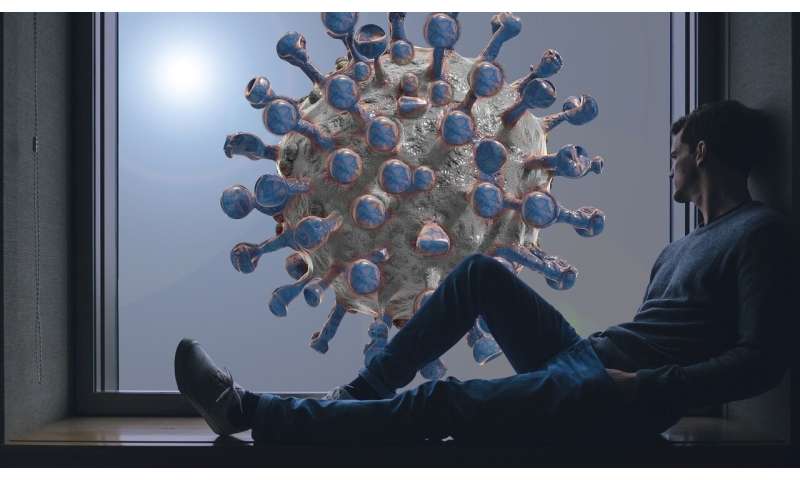
A loaf of bread and a gallon of milk, a dozen eggs and onto the checkout line. “Paper or plastic?” or fill your own bag, then out the door.
It used to be so simple, the quick run to the supermarket.
Now, in this age of coronavirus and COVID-19, even everyday tasks such as grocery shopping have changed, with new rules replacing the routine.
For people already grappling with anxiety, the shopping experience can awaken a fresh set of worries as California begins to reopen retail as the state emerges from shutdown imposed to slow the spread of COVID-19. California Gov. Gavin Newsom announced this week that some retail could reopen Friday with restrictions, such as curbside service.
“It’s a very common problem,” said Peter Yellowlees, chief wellness director at UC Davis Health. “If you were anxious before COVID, this may make you more so.”
Anxiety swirls around this virus, touching family, health, finances and livelihood, and finding its way into everyday life. Your pre-coronavirus supermarket trip already demanded multiple decisions, with some routine, of where to park, large cart or basket, frozen or fresh, sale or favorite item, debit or cash. A Cornell University study cited in a Washington Post story about shopping noted that we make more than 200 food decisions a day.
On top of that now, you’re trying to figure out where to stand in line and why the plastic bags seem so sealed and how you need to stand farther away from the shoppers who just licked their fingers to try to pry them open. Add to that learning curbside retail.
A March poll by the American Psychiatric Association on COVID-19 revealed how much anxiety has consumed us.
The association’s national poll found nearly six in 10 Americans felt coronavirus seriously disrupted their daily lives; 48% were anxious about contracting coronavirus; while 36% more than one in every three Americans said the virus was having a serious effect on their mental health.
“There’s no one I’ve seen who is not impacted by COVID,” La Tanya Takla, an educational psychologist and licensed marriage and family therapist based in Sacramento, said Wednesday. “The fear of getting it, the inundation of it in the news, is debilitating for some people. Germs have always lived with us. What makes this different is how many people are getting sick from it.”
Takla, Yellowlees and Adriana Joyner, a licensed Sacramento-area psychotherapist, are unanimous in how to tackle the supermarket and combat anxiety: Have a plan to get through it.
“One of the main ways that you can manage heightened anxiety around shopping trips, particularly as California begins phased reopening, is to have a plan in place that helps you feel comfortable, secure and as safe as possible.”
That could mean a quick checklist of the things that trigger anxiety at the store and how to navigate them, Joyner said.
“Is it the people around you without face masks? Is it the crowds? Is it having to touch items such as the cart?” she said.
Her advice:
Be prepared with masks, gloves and hand sanitizer.
Have an easy-to-reach payment option to avoid fumbling through a wallet or purse after handling store items.
Bring a shopping list to help shorten your trip through the store.
Shop during low-traffic times and, if, possible, find a store that fits your comfort level.
“If you feel more comfortable wearing a mask, choose a store that requires patrons to wear masks,” Joyner said.
Understanding the underlying trigger for the anxiety, Joyner said, will help to pinpoint those fears, directly address them and reestablish control.
Grocers from Raley’s to Safeway, Sprouts to Sam’s Club and many others, have rushed in steps to reassure anxious shoppers, offering delivery service that has become a lifeline to many sheltering at home. Nugget Stores require patrons to wear masks. Raley’s requires its employees to don the face coverings.
And, at a busy Raley’s at Elk Grove and Franklin boulevards in Elk Grove late Thursday afternoon, a view from a crowded parking lot showed how quickly the new normal has taken hold:
Forget the reusable plastic bags, rendered suddenly obsolete by the public health crisis. Keep them in the trunk. Be sure to toss your used wipes, gloves and trash in the proper waste bin. Six feet of social distancing, please. Make room and wear your mask. Most shoppers’ faces were covered Thursday, all part of a routine quickly becoming as common as the shoes-laptop-and-belt ritual through airport security.
Meantime, a clerk outside the store’s entrance sprayed down several rows of shopping carts with a foamy green sanitizing solution to ready them for the next wave of customers.
And as department stores and shopping malls prepare to reopen and rejoin the economy, they, too, are offering reassurances of their own.
Macy’s, Gap and Kohl’s, to name three, will install Plexiglas barriers at checkout registers, post hand-sanitizer stations throughout the store, require employees monitor their temperatures before the report for work and wear masks on the job.
Kohl’s will close its fitting rooms and dedicate special shopping hours for patrons deemed at-risk, including seniors, pregnant women and those with underlying health conditions.
Gap will encourage customers to wear masks and all will quarantine returned items for 24 hours before restocking them on the sales floor.
Meantime, hand sanitizing stations, park-and-wait and curbside delivery and directional flow floor arrows are becoming commonplace at grocery stores.
Services such as Instacart are also filling the home-delivery void. Home shoppers can watch from their devices as their digital grocer roams the aisles to fill their orders.
But delivery costs add up and is not an option for everyone. Enlisting friends, family and neighbors who are shopping to pick up and drop off items is a potential solution.
In the grocery store or at home, having a shopping routine when so much has changed can also pay dividends in peace of mind.
“Think about what you can do,” Takla said.
Source: Read Full Article
